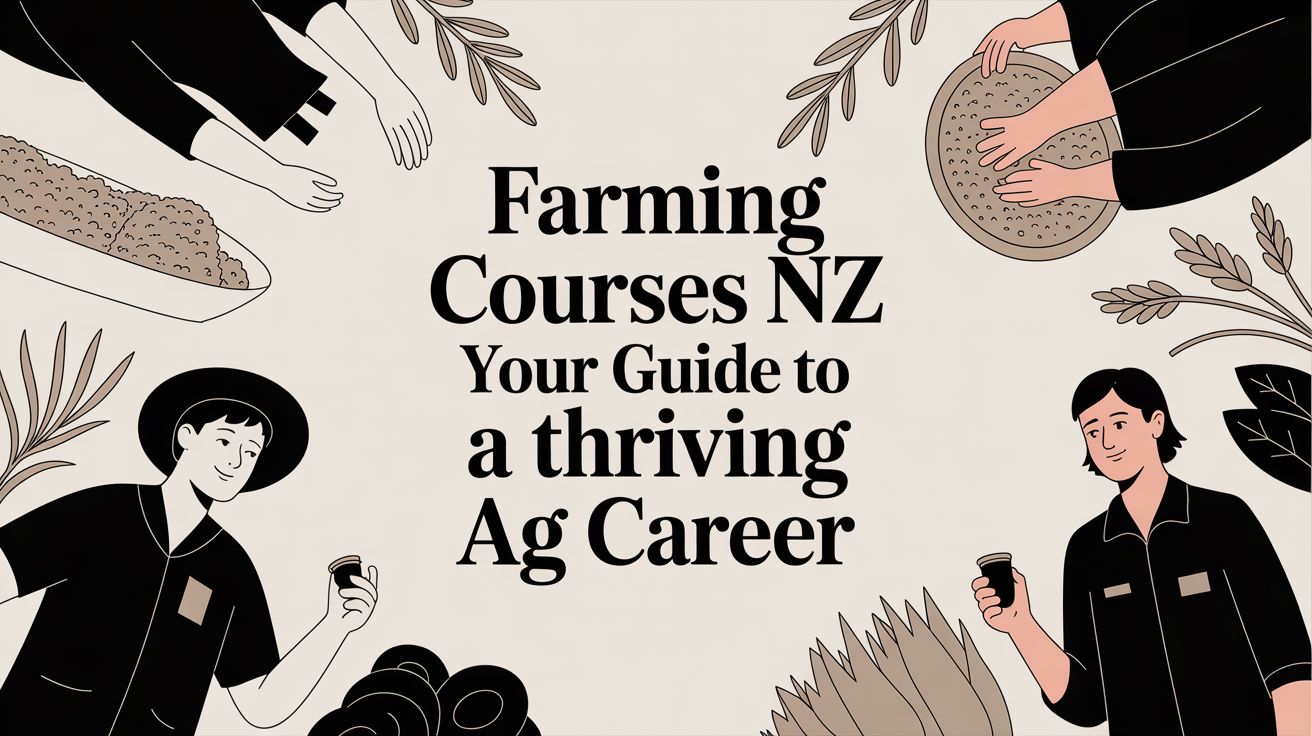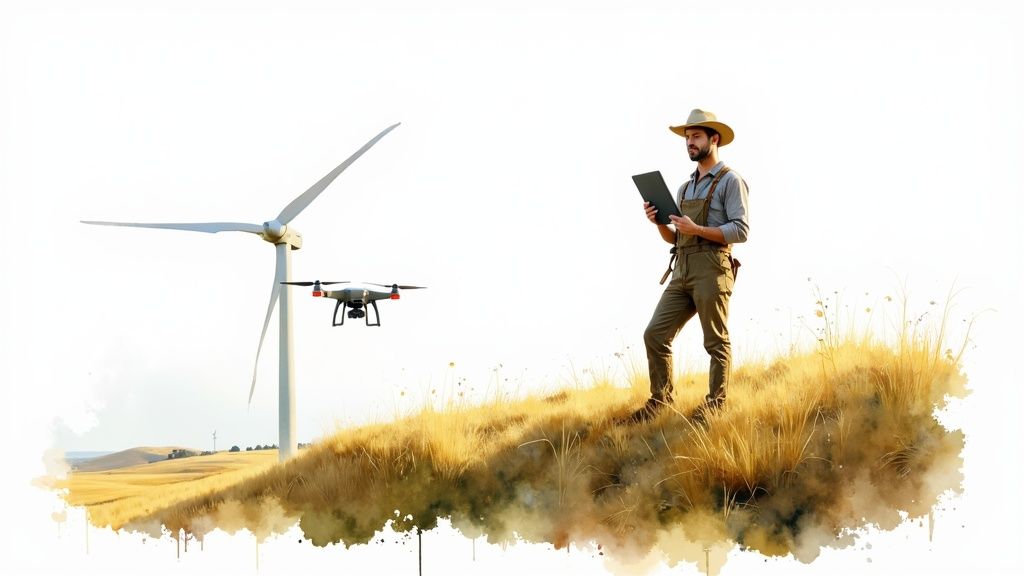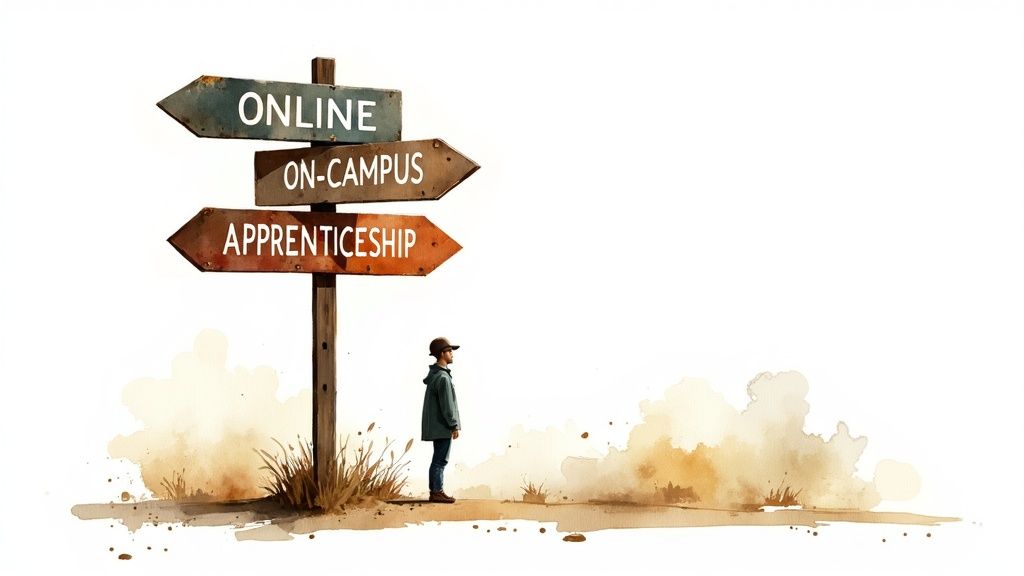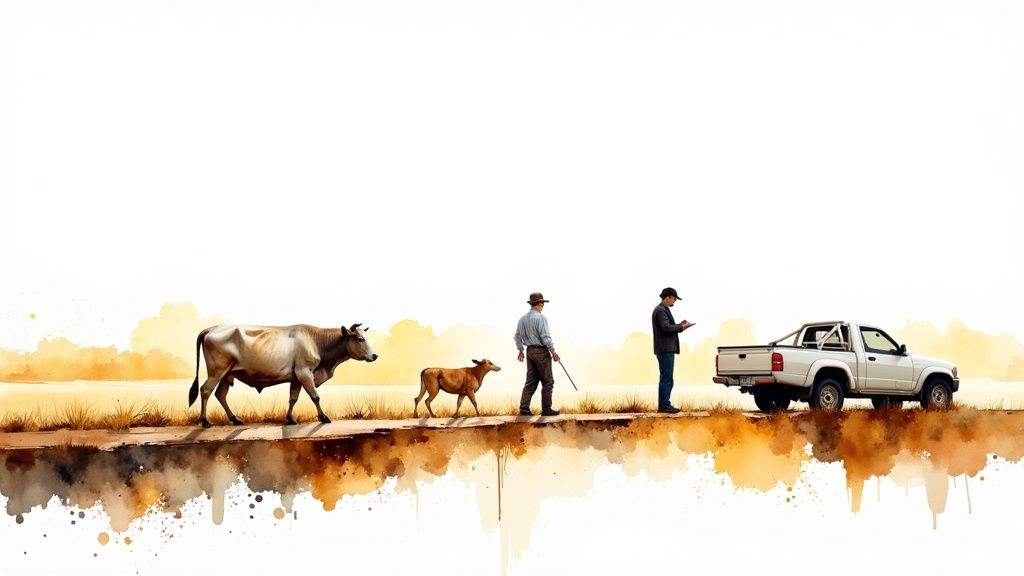
Farming Courses NZ Your Guide to a Thriving Ag Career
Thinking about a career on the land? Taking one of the many farming courses NZ has on offer is the perfect way to get your foot in the door of our most important industry. Think of this guide as your first step—a way to figure out how your passion for the land can grow into a real career, packed with practical skills, science, and a bit of business savvy.
Your Agricultural Career Starts Here

Picture yourself right at the heart of New Zealand's primary industries. A job in agriculture these days is so much more than just working the land. It’s about being a pioneer in sustainability, getting your hands on some seriously cool tech, and helping shape how we produce food for Aotearoa and the rest of the world.
This guide is where it all begins. We're going to dive into what modern NZ farming is all about, leaving behind the old stereotypes to show you a sector that's bursting with opportunities. This is a field where tradition and innovation shake hands, creating a huge demand for skilled people who can think on their feet and lead the way.
What Modern Farming Involves
Today’s farming scene is incredibly varied and, frankly, exciting. The skills you pick up won't box you into one role; they’ll open doors right across the industry. To keep up, it's becoming more and more important to understand things like drones for agriculture and other smart farming tools that are changing the game.
Your career could head down some really interesting paths:
- Hands-On Farm Management: You could be the one in charge of livestock, pasture, and the day-to-day buzz on a dairy, sheep, or beef farm.
- Specialised Horticulture: Maybe you're more interested in high-value crops like kiwifruit, wine grapes, or avocados, managing everything from the soil up to the final harvest.
- Agribusiness and Technology: You could be on the business side of things, working in supply chain management, rural finance, or rolling out the latest farm tech.
- Environmental Science: Or you could focus on developing sustainable farming systems that protect our natural resources for the generations to come.
A qualification is more than a piece of paper; it’s a toolkit. It equips you with the credibility, knowledge, and confidence to solve real-world problems, whether you’re improving herd genetics, managing a multi-million dollar budget, or restoring a native waterway.
Picking the right course is your first big decision. From practical, learn-as-you-go training to in-depth university degrees, there’s a pathway for everyone. It’s worth exploring flexible, career-focused farming courses designed for New Zealanders to see how you can fit study into a busy life. Let this guide be your roadmap.
Decoding NZ Farming Qualifications

Jumping into your farming education can feel a bit like trying to navigate a huge, unfamiliar paddock. Let's make it simple. Getting your head around New Zealand's agricultural qualifications is the first step to matching your goals with the right farming courses NZ has on offer.
Think of it like building a new fence line. You have to start with the basics and put in the foundation posts before you can run the wires. That’s pretty much how the NZ Qualifications Framework (NZQF) works—each level builds on the last, taking you from day-one skills to big-picture thinking.
Certificates: The Foundation of Your Farming Career
Certificates, which usually cover NZQF Levels 2 to 4, are your starting point. These courses are all about getting your hands dirty with the essential, practical skills you need to be useful and safe on a farm from the get-go.
A Level 2 Certificate is like learning to drive the ute. You’ll cover the absolute fundamentals, like basic animal handling, on-farm safety, and how to operate essential gear like quad bikes. It’s the perfect launchpad for someone with little or no farming experience.
Move up to Levels 3 and 4, and you’re not just driving the ute—you're learning how to maintain it and plan a route. These courses go deeper into skills like pasture management, basic animal health, and tractor operation. They’re ideal for junior farmhands who want to get a formal qualification under their belt and step up.
- Who they suit: School leavers, people changing careers, or anyone just starting out on a farm.
- What you learn: Core hands-on skills, health and safety, basic machinery use, and the fundamentals of livestock or crop work.
- Outcome: You’ll be a capable and confident farm assistant or junior stockperson, ready to hit the ground running.
Diplomas: Specialising and Stepping Up
Once your foundation posts are in, it’s time to decide which paddock you're fencing off. Diplomas, sitting at Levels 5 and 6, are where you start to specialise. These qualifications move beyond the "how-to" and dig into the "why."
Think of a Level 5 Diploma as marking out your first big paddock. You’ll build on your practical skills with more advanced technical knowledge in a specific area, like dairy farming, livestock production, or horticulture. You'll get into the details of breeding programmes, feed budgeting, and farm-level financial planning.
Level 6 Diplomas take it a step further, getting you ready for management. This is where you learn to oversee the whole fencing project. The focus shifts to making strategic calls, supervising staff, and managing the business side of a modern farm.
A diploma bridges the gap between doing the work and managing the work. It gives you the technical and business know-how to run a specific part of a farm—or the entire operation—efficiently and profitably.
The best part about diplomas is their tight connection to the industry. They’re designed to meet the real-world needs of New Zealand’s primary sector, which makes graduates highly sought after for roles like herd manager, stock manager, or block manager.
Degrees: Mastering the Whole Farming System
Degrees and other advanced qualifications at Level 7 and above are the top tier. If certificates are about the foundation posts and diplomas are about fencing the paddock, a degree is about understanding and managing the entire farm as a complete system.
These programmes dive deep into the science, tech, and business that drive modern agriculture. You’ll tackle subjects like soil science, plant pathology, animal genetics, agribusiness management, and environmental sustainability. It’s all about learning to think critically, solve complex problems, and innovate.
Degrees are for those with their eyes on leadership roles, research positions, or specialised consultancy. They open doors to careers that will shape the future of farming in New Zealand. It’s no surprise that agriculture is still a popular choice for tertiary students; in 2023, 3,460 domestic students were enrolled in agriculture-related programmes across the country. You can explore more data about these student enrolments to see the trends for yourself.
Choosing the right qualification level is the most important decision you'll make at the start. To make it easier, the table below breaks down the options at a glance.
NZ Farming Qualification Levels at a Glance
This table compares the different agricultural qualification levels in New Zealand, giving you a clear idea of who they’re for, how long they take, and where they can lead.
Ultimately, the best path for you depends on your personal goals, what experience you already have, and how you like to learn. Each level provides a valuable and well-respected pathway into New Zealand’s dynamic and essential agricultural sector.
How to Choose the Right Farming Course

Finding the perfect course isn't just about the qualification level. It’s about finding the right fit for your life, your learning style, and where you want to go in your career. The best farming courses NZ has on offer are the ones that actually work for you, whether you're fresh out of school and keen for campus life or already working full-time and need something flexible.
Think of it like choosing a new piece of farm gear. You wouldn’t buy a massive combine harvester for a small lifestyle block; you need the tool that fits the job. Let’s break down how to make that choice, so you can be sure you’re investing your time and money wisely.
Matching Delivery Mode to Your Lifestyle
The first big question is a simple one: how do you actually want to learn? The way a course is delivered will have the biggest impact on your day-to-day life. Your main options are on-campus, online, or a bit of both.
- On-Campus Learning: This is the classic, full-on experience. It’s ideal if you thrive on face-to-face interaction and a set timetable. It’s a fantastic choice for school leavers or anyone wanting to dive into a full-time, immersive education.
- Online and Distance Learning: Perfect for anyone already working in the industry or juggling family and other commitments. These courses give you the freedom to study whenever and wherever suits you, making education accessible no matter how remote your farm is.
- Blended or Hybrid Models: This approach gives you the best of both worlds, mixing online theory with practical, in-person workshops or block courses. It’s a great balance, offering the flexibility of distance learning with essential hands-on sessions.
There’s a clear demand for this kind of flexible, post-school training. While New Zealand has a relatively low number of 15-19 year olds in upper secondary vocational programmes (at just 5.6%), it boasts one of the highest rates for post-secondary programmes. In fact, 10% of 20-24 year olds are taking part. This shows a strong trend of people seeking practical qualifications after leaving school, often while holding down a job. You can discover more insights about NZ's education profile over on the OECD's site.
Evaluating the Practical Components
Farming is a hands-on job. Full stop. So, the practical side of any course you’re considering is non-negotiable. Don't just glance at the course title; get into the details of how you’ll gain and be tested on your real-world skills.
Make sure you ask some direct questions about the practical side of things:
- How are practical skills actually taught and assessed?
- Are there work placement requirements or on-farm block courses?
- If you're already working, can you get your assessments done at your own workplace?
The best courses are the ones that seamlessly weave theory and practice together. They make sure that what you learn on a screen or in a classroom directly translates into confident, competent actions out in the paddock, the shed, or the orchard.
Providers like Prac Skills are built around this exact model. They’re set up to let you complete practical assessments on your own farm or workplace, which makes the qualification incredibly relevant to your day-to-day work. This 'earn while you learn' approach is both efficient and hugely valuable.
Provider Reputation and Specialisations
Finally, take a good look at the provider itself. You want an institution with a solid reputation and strong ties to New Zealand’s agricultural industry. Always check for accreditation from the New Zealand Qualifications Authority (NZQA). This is your guarantee that the qualification is nationally recognised and respected by employers.
Beyond that, see what they specialise in. Some providers are known for their dairy programmes, others for horticulture, and some for broad agribusiness management. If you’ve got a specific career path in mind, choosing a provider known for its expertise in that area can give you a real leg up.
For instance, if your goal is to climb the ladder into a senior management role on a dairy farm, it makes perfect sense to look at a targeted programme like an Advanced Dairy Farm Management bundle. Courses like this cover everything from financial planning to staff leadership, giving you the specific skills you need. By weighing up the delivery, practicals, and provider focus, you can confidently pick a course that will genuinely set you up for success.
Funding Your Agricultural Education
Thinking about your future in farming is exciting, but let's be honest—the cost of getting qualified can feel like a massive hurdle. It shouldn't be. A rewarding career on the land is well within reach, and thankfully, you don't have to go it alone.
We're going to break down the costs and, more importantly, the funding solutions available for farming courses in NZ. From government help to industry scholarships and the classic 'earn while you learn' model, there are plenty of ways to make your dream a reality.
Government Support and Initiatives
First things first, the New Zealand government has some great support systems to help people get into tertiary study. Getting your head around these is the best place to start when mapping out your financial plan.
For eligible Kiwis, there are two main options on the table:
- Fees Free: This is a brilliant leg-up for anyone new to tertiary education. If you're a NZ citizen or resident (who's lived here for at least three years) and this is your first time studying at this level, you could be eligible. The scheme covers your tuition fees for one year of full-time study (up to a cap), taking a huge bite out of the initial cost.
- Student Loans and Allowances: If Fees Free doesn't cover everything, or if you're not eligible, StudyLink is your next stop. Student loans can help with compulsory course fees, those extra costs like textbooks and gear, and even your living expenses. On top of that, Student Allowances are available for some students to help with living costs—and the best part is, you don't have to pay them back.
Think of these government programmes as the essential tools in your shed. They provide the foundation, making it possible for anyone with the passion and drive to get qualified, no matter what their financial starting point looks like.
Industry Scholarships and Apprenticeships
It’s not just the government that’s keen to help. The agricultural industry itself is always on the lookout for fresh talent and invests heavily in nurturing the next generation.
Many organisations offer scholarships specifically for students jumping into farming-related qualifications. These can range from a few hundred dollars to help with course fees, right up to major awards that come with mentorship and priceless work experience. A great place to kick off your search is with industry bodies like DairyNZ, Beef + Lamb New Zealand, or Federated Farmers. They often run their own scholarship programmes or can point you in the direction of trusts and businesses that back new students.
Then there's the apprenticeship model, a powerful option that truly captures the 'earn while you learn' spirit. This pathway is perfect if you want to mix practical, on-the-job training with formal study. You’ll be employed on a farm, putting what you learn into practice straight away while working towards your qualification and earning a wage. It’s a fantastic way to gain real-world experience, build connections, and dodge a big student loan. It's a highly respected route into the industry, producing skilled, work-ready graduates who are snapped up across New Zealand.
Your Career Path After Graduation

Finishing a qualification in agriculture isn't the end of the road—it's the beginning of one. So, what does life actually look like on the other side? A certificate or diploma is your ticket into an industry that forms the very backbone of New Zealand's economy, opening up a world of opportunities that go far beyond traditional farm work.
Think of your future career not as a single track, but as a branching path with exciting possibilities both on and off the farm. The skills you pick up are incredibly versatile, meaning you can move across the entire primary industry, from hands-on production right through to the corporate agribusiness world. This is about building a rewarding, long-term career where the sky's the limit.
The sector itself is a huge employer. As of March 2023, a massive 360,000 people—or 12.4% of the entire New Zealand workforce—were employed in the primary industries. This figure alone shows just how vital a solid agricultural education is to keep the industry thriving.
On-Farm Management Roles
For many graduates, the most direct path leads straight to management roles right on the farm. These are the jobs where your practical skills and technical know-how truly come alive, making a real difference to productivity and animal welfare every single day.
Stock Manager: In this role, you’re the go-to person for the health, breeding, and performance of livestock on a sheep and beef station or dairy farm. Your day could involve anything from managing feed budgets and planning grazing rotations to putting animal health plans into action.
Herd Manager: Specifically on a dairy farm, you'll be overseeing the milking herd, managing staff, and making sure milk quality and production targets are hit. It’s a fast-paced job that perfectly blends animal husbandry with people leadership.
Orchard or Vineyard Supervisor: If horticulture is more your thing, you could find yourself managing a team of workers, overseeing spray programmes, and ensuring the quality and yield of high-value crops like kiwifruit, apples, or wine grapes.
For anyone aiming for a career in livestock management, getting a handle on efficient and safe animal handling is non-negotiable. This extends to the infrastructure you work with, and learning about modern cattle yard design principles is a perfect example of the practical, valuable knowledge you gain in a good farming course.
Off-Farm Specialist and Advisory Careers
Here’s a secret: your agricultural qualification doesn't tie you to the farm gate. Some of the most influential and exciting roles are actually off-farm, supporting the wider industry with specialist knowledge and strategic advice.
These careers often mix science, business, and communication, making them a great fit for anyone who loves solving problems and working with a wide range of people.
A qualification in agriculture teaches you how to think, not just what to do. You learn to analyse data, manage resources, and make informed decisions—skills that are in high demand right across the supply chain, from the soil to the supermarket shelf.
Some of these rewarding off-farm pathways include:
- Rural Consultant or Farm Advisor: You’ll work shoulder-to-shoulder with farmers, helping them boost their business performance, navigate tricky environmental regulations, and embrace new technologies.
- Agronomist: As a crop and soil expert, you'll advise farmers on everything from fertiliser application and pest control to sustainable cropping strategies.
- Agribusiness Professional: This is a broad category covering roles in rural banking, fertiliser and seed sales, stock and station agencies, and supply chain management.
- Biosecurity Officer: You could be on the front lines, protecting New Zealand's vital primary industries from pests and diseases at our borders.
Whether your passion lies in the high-country tussock, the genetics lab, or the boardroom, completing one of the many farming courses NZ has to offer is your first step. It gives you the credibility and the skills you need to build a dynamic and successful career in an industry that truly matters.
Exploring Top NZ Training Providers
With so many excellent options out there, figuring out where to even start your search for farming courses in NZ can feel like a big job. The secret is to find a provider whose learning style actually fits your life.
New Zealand’s agricultural education scene is incredibly diverse. It caters to everyone from school leavers ready for a full-time campus experience to seasoned farmworkers who need to upskill without downing tools. This variety means the perfect fit is out there for you. Your main options generally fall into three camps: universities, polytechnics, and specialised training providers, each with its own strengths.
Universities and Polytechnics
Universities like Lincoln and Massey are the powerhouses of agricultural research and theory. If you're aiming for a career in farm science, agribusiness, or consultancy, their in-depth degree programmes are hard to beat. They really dig into the complex systems behind modern farming.
Polytechnics, on the other hand, are the champions of hands-on, vocational training. They offer a fantastic balance of classroom theory and practical application, often with strong local industry connections that can lead straight to a job. These institutions are brilliant for getting the skills needed for farm management roles.
Flexible and Online Specialists
A third model has become incredibly popular, especially for those already working in the industry. These specialised providers focus on flexible, work-based learning that fits around your job.
This 'earn while you learn' approach is designed for the reality of farm life. It recognises that for many, taking time off for full-time study simply isn't an option. It makes education accessible, practical, and immediately relevant to your daily work.
Organisations like Prac Skills are a great example of this modern approach. Their online delivery means you can tackle the theory from anywhere, while the practical assessments are often completed right on your own farm or workplace. This method lets you gain a formal, NZQA-recognised qualification without having to press pause on your career.
You can explore a whole range of specialised agriculture and farming courses to see how this flexible model works in practice.
Common Questions About Farming Courses
So, you’re looking into farming courses but still have a few questions rattling around. That’s completely normal. This last section is all about tackling those practical, need-to-know details that are likely on your mind.
We've pulled together the most common queries we hear from people just like you. Think of this as your final checklist to clear up any lingering uncertainties before you jump into your agricultural journey.
Do I Need Farm Experience to Enrol?
This is a big one, and the short answer is: it really depends on the level of the course you're looking at.
Plenty of introductory certificates, especially at Level 2 and 3, are built from the ground up for total beginners. They’re a fantastic launchpad if you're new to the sector, covering the absolute fundamentals of safety, animal handling, and basic farm jobs.
On the other hand, higher-level diplomas or more advanced programmes will often ask for some hands-on experience or a prior qualification. Providers know people come from all sorts of backgrounds, so your best bet is to always check the specific entry requirements for the course that catches your eye.
Can I Study Online While Working?
Absolutely. The whole 'earn while you learn' model is taking off across New Zealand's primary sector, and for very good reason. It’s a smart solution that fits the reality of life on the land.
Many providers now design their farming courses specifically for people already in the workforce. This usually means you cover the theory online in your own time, then get the practical side of things signed off right there at your own workplace. It’s a brilliant way to get a formal, NZQA-recognised qualification without having to press pause on your career or your income.
This flexible model perfectly bridges the gap between education and employment. It makes sure what you're learning is directly relevant to your current job, turning the qualification into a tool for immediate professional growth.
What Is the Difference Between Agriculture and Horticulture?
It’s easy to lump these two together, but they actually lead down quite different career paths. The simplest way to tell them apart is to think about the scale and what’s being produced.
- Agriculture courses are generally about livestock (think dairy, sheep, and beef) and broad-acre farming. This means large-scale pasture and crop systems that cover a lot of ground.
- Horticulture courses zoom in on more intensive plant cultivation. This is everything from orchards and vineyards to market gardens, nurseries, and glasshouse operations.
While the core ideas of managing the land are similar, the day-to-day skills you'll need are pretty distinct. It’s worth figuring out which path genuinely sparks your interest the most.
Are NZ Farming Qualifications Recognised Overseas?
Yes, they are. Any qualification that sits within the New Zealand Qualifications Authority (NZQA) framework is held in high regard internationally. New Zealand has a world-class reputation for its pastoral farming systems, agricultural innovation, and sustainable practices.
That global standing means a qualification earned here carries real weight, particularly in countries with similar farming sectors like Australia, the UK, Canada, and Ireland. For any graduates with a bit of a travel bug, this opens up some incredible career opportunities around the globe and the chance to bring new skills back home.
.webp)

